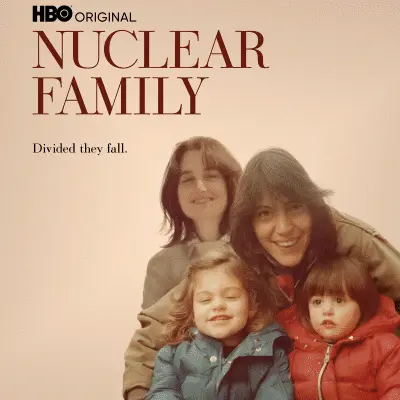With HBO's Nuclear Family, director Ry Russo-Young tells a poignant story about her messy upbringing
-

The three-part docuseries Nuclear Family tells the story of how Russo-Young, raised by two lesbian moms, had her childhood upended when her biological father, who was the sperm donor, fought in court for paternity rights. "Russo-Young’s storytelling approach has the warm, sometimes devastating intimacy of a personal collage," says Angie Han. "She cuts and pastes snippets from old home movies, archival footage and present-day interviews with friends and family to piece together her narrative. Tasteful reenactments and playful montages convey the spirit of events that weren’t captured in the moment, while clips from contemporary media help situate the family’s ordeal in the cultural context of the times — why have a talking-head expert tell us what the 1990s ideal of fatherhood was, when Russo-Young can just show us Dan Conner, Danny Tanner and Tim Taylor? At times, the format can suggest suspense where there doesn’t need to be any, or create mild confusion about the provenance of certain materials. But it does prioritize an emotional truthfulness in a way that a drier, more detached style might have struggled to achieve. The family’s story necessarily dovetails with the recent history of LGBTQ rights in America, serving up snapshots of a community in the midst of rapid change. It’s not even until a friend passes Russo and Young a pamphlet in the late 1970s that it even occurs to them they might be able to have children of their own; by the time Steel takes them to court in the 1990s, judges still tend to favor biological parental relationships and rule against same-sex couples. Steel’s lawsuit, in Russo and Young’s eyes, is not just a betrayal but an existential threat to the life they’ve built in a world still skeptical they should be allowed to have it at all — and win or lose, their case has the potential to set precedents for similar cases to follow."
ALSO:
- At its core, Nuclear Family is a powerful, intimate examination of a family fighting for its right to exist
- In various ways, Nuclear Family proves a more nuanced reflection of a complicated childhood than HBO’s much-discussed Allen v. Farrow
- Ry Russo-Young on making Nuclear Family: “It feels like this is my first film. Or all the films I’ve been making in my whole life have led up to this film"
TOPICS: Nuclear Family, HBO, Ry Russo-Young, Documentaries
More Nuclear Family on Primetimer:
